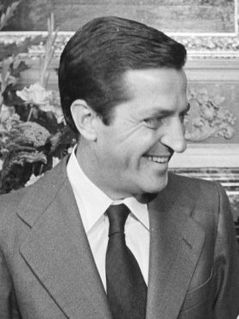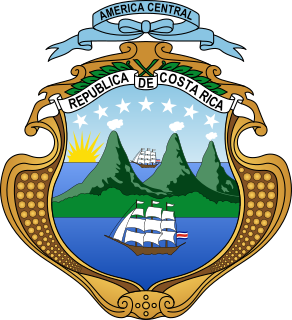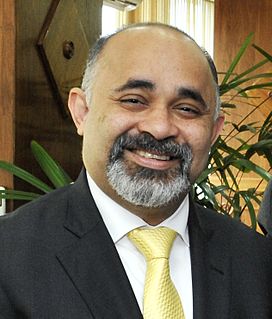
El Salvador is a member of the United Nations and several of its specialized agencies, the Organization of American States (OAS), the Central American Common Market (CACM), the Central American Parliament (PARLACEN), and the Central American Integration System (SICA). It actively participates in the Central American Security Commission (CASC), which seeks to promote regional arms control.

The politics of Bolivia takes place in a framework of a presidential representative democratic republic, whereby the president is head of state, head of government and head of a diverse multi-party system. Executive power is exercised by the government. Legislative power is vested in both the government and the two chambers of parliament. Both the Judiciary and the electoral branch are independent of the executive and the legislature. After the 2014 election, 53.1% of the seats in national parliament were held by women, a higher proportion of women than that of the population.

The Legislative Assembly forms the unicameral legislative branch of the Costa Rican government. The national congress building is located in the capital city, San José, specifically in Carmen district of the San José canton.

The Cabinet of Ministers of Venezuela (Spanish: Gabinete de Ministros de Venezuela is one of the bodies that make up the Venezuelan executive in that country's presidential system, alongside the Council of Ministers. The Cabinet is headed by the President of Venezuela, and his corresponding Vice President. The purpose of the ministries is to create, adopt, follow and evaluate policies, strategies, programs and projects in accordance with the constitution and the laws of the Republic.

The second government of Adolfo Suárez was formed on 5 July 1977 following the latter's confirmation as Prime Minister of Spain by King Juan Carlos I on 17 June, as a result of the Union of the Democratic Centre (UCD) emerging as the largest parliamentary force at the 1977 general election. It succeeded the first Suárez government and was the Government of Spain from 5 July 1977 to 6 April 1979, a total of 640 days, or 1 year, 9 months and 1 day.

The president of the Valencian Government is the head of the Generalitat Valenciana, the government of the Spanish autonomous community of Valencia. The president is chosen by the Valencian parliament, the Corts Valencianes.

The third government of Adolfo Suárez was formed on 6 April 1979 following the latter's election as Prime Minister of Spain by the Congress of Deputies on 30 March and his swearing-in on 2 April, as a result of the Union of the Democratic Centre (UCD) emerging as the largest parliamentary force at the 1979 Spanish general election. It succeeded the second Suárez government and was the Government of Spain from 6 April 1979 to 27 February 1981, a total of 693 days, or 1 year, 10 months and 21 days.

The first government of Adolfo Suárez was formed on 8 July 1976 following the latter's appointment as Prime Minister of Spain by King Juan Carlos I on 3 July and his swearing-in on 5 July, as a result of Carlos Arias Navarro's resignation from the post on 1 July 1976. It succeeded the second Arias Navarro government and was the Government of Spain from 8 July 1976 to 5 July 1977, a total of 362 days, or 11 months and 27 days.

The Ministry of the Presidency is a ministry of the Republic of Costa Rica created on 24 December 1961 through Law 2980. Its work prescribed by law consists in providing support to the President of the Republic, serving as a liaison between the Presidency and the other branches of government, civil society and the various ministries.

José Manuel Rodríguez Uribes is a Spanish philosopher of law and politician of the Spanish Socialist Workers' Party (PSOE) who has been serving as Minister of Culture and Sport in the government of Prime Minister Pedro Sánchez since 2020. He is also a member of the PSOE's federal executive board.

The second government of José Luis Rodríguez Zapatero was formed on 14 April 2008 following the latter's election as Prime Minister of Spain by the Congress of Deputies on 11 April and his swearing-in on 12 April, as a result of the Spanish Socialist Workers' Party (PSOE) emerging as the largest parliamentary force at the 2008 Spanish general election. It succeeded the first Zapatero government and was the Government of Spain from 14 April 2008 to 22 December 2011, a total of 1,347 days, or 3 years, 8 months and 8 days.

The first government of Mariano Rajoy was formed on 22 December 2011 following the latter's election as Prime Minister of Spain by the Congress of Deputies on 20 December and his swearing-in on 21 December, as a result of the People's Party (PP) emerging as the largest parliamentary force at the 2011 Spanish general election. It succeeded the second Zapatero government and was the Government of Spain from 22 December 2011 to 4 November 2016, a total of 1,779 days, or 4 years, 10 months and 13 days.

The second government of José María Aznar was formed on 28 April 2000 following the latter's election as Prime Minister of Spain by the Congress of Deputies on 26 April and his swearing-in on 27 April, as a result of the People's Party (PP) emerging as the largest parliamentary force at the 2000 Spanish general election. It succeeded the first Aznar government and was the Government of Spain from 28 April 2000 to 18 April 2004, a total of 1,451 days, or 3 years, 11 months and 21 days.

The third government of Felipe González was formed on 7 December 1989 following the latter's election as Prime Minister of Spain by the Congress of Deputies on 5 December and his swearing-in on 6 December, as a result of the Spanish Socialist Workers' Party (PSOE) emerging as the largest parliamentary force at the 1989 Spanish general election. It succeeded the second González government and was the Government of Spain from 7 December 1989 to 14 July 1993, a total of 1,315 days, or 3 years, 7 months and 7 days.

The fourth government of Felipe González was formed on 14 July 1993 following the latter's election as Prime Minister of Spain by the Congress of Deputies on 9 July and his swearing-in on 13 July, as a result of the Spanish Socialist Workers' Party (PSOE) emerging as the largest parliamentary force at the 1993 Spanish general election. It succeeded the third González government and was the Government of Spain from 14 July 1993 to 6 May 1996, a total of 1,027 days, or 2 years, 9 months and 22 days.

George Hilton dos Santos Cecílio more commonly known as George Hilton is a Brazilian politician and radio personality. Although born in Bahia, he has spent his political career representing Minas Gerais, having served as state representative since 2007.

The fifth government of Francisco Franco was formed on 25 February 1957. It succeeded the fourth Franco government and was the Government of Spain from 25 February 1957 to 11 July 1962, a total of 1,962 days, or 5 years, 4 months and 16 days.

Erick Rodríguez Steller is a Costa Rican politician, deputy in Costa Rica in the 2018-2022 period. He was elected by the National Integration Party during Juan Diego Castro Fernández candidacy, but then declared himself an independent deputy, a month before taking office soon after Castro did the same. Later, he would announce his incorporation into the New Generation Party.

The Cabinet of Jeanine Áñez constituted the 220th and 221st cabinets of the Plurinational State of Bolivia. It was initially formed on 13 November 2019, a day after Jeanine Áñez was sworn-in as the 66th president of Bolivia following the 2019 political crisis, in which the ruling Movement for Socialism government resigned. A second cabinet was formed on 28 January 2020 with all but three ministers being ratified in their positions.



















